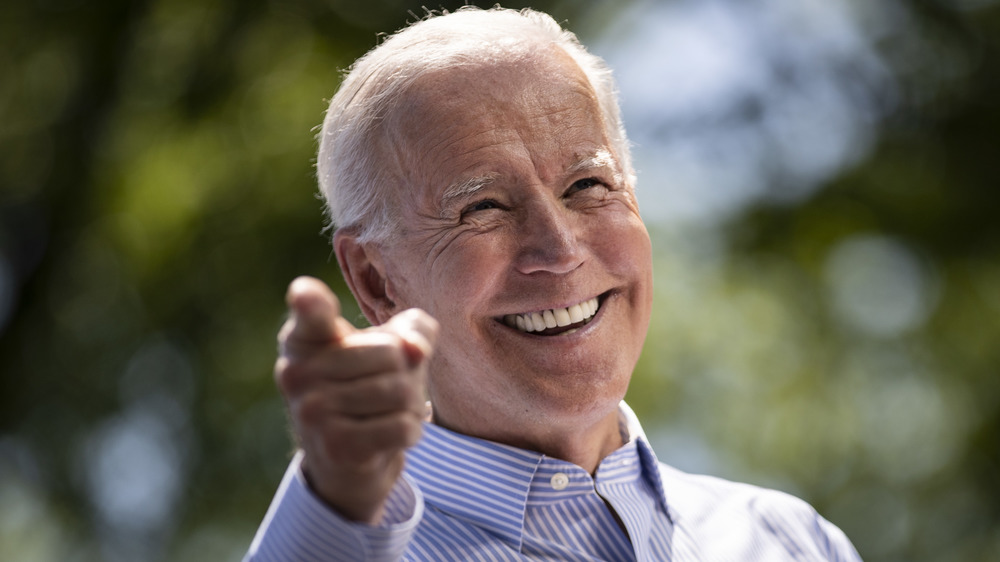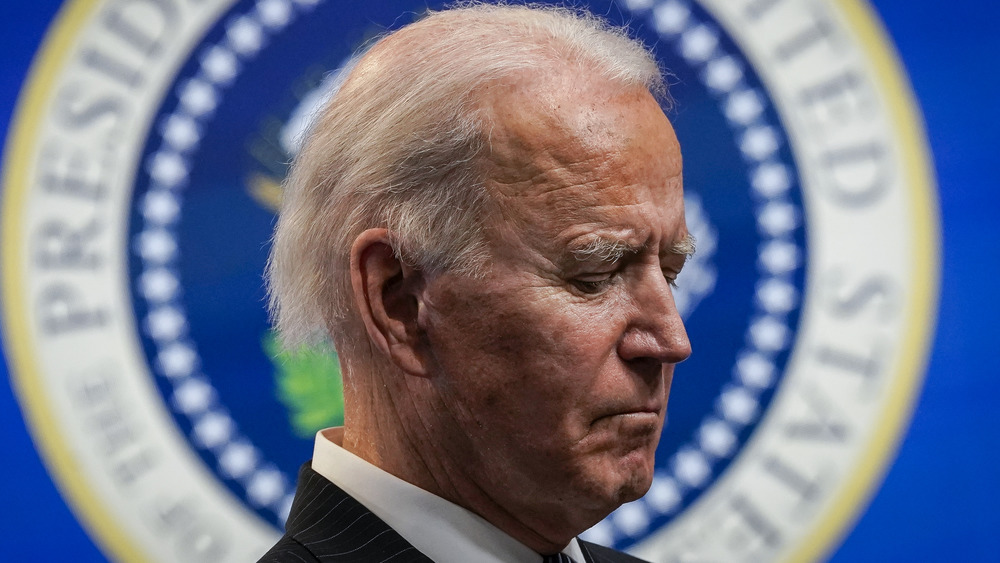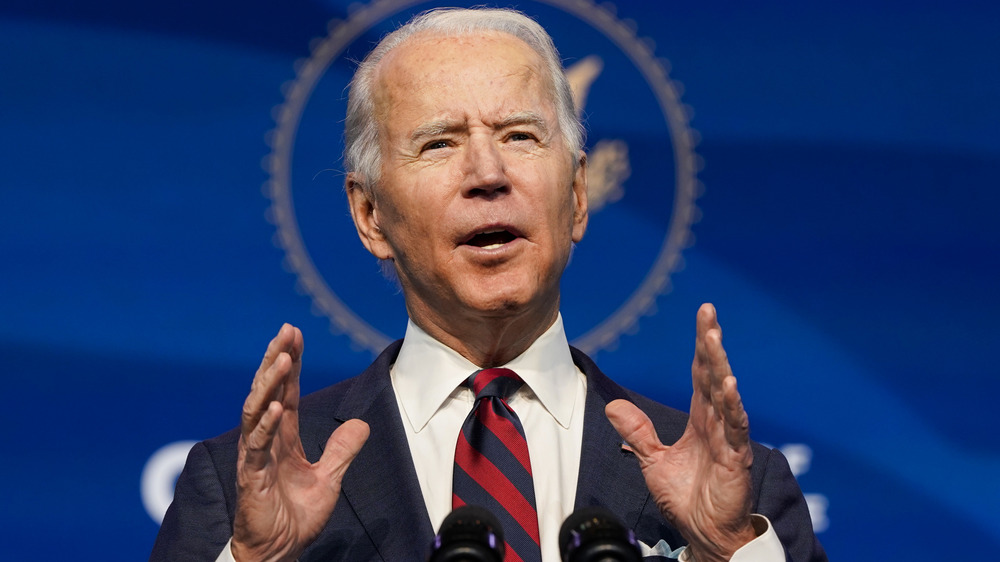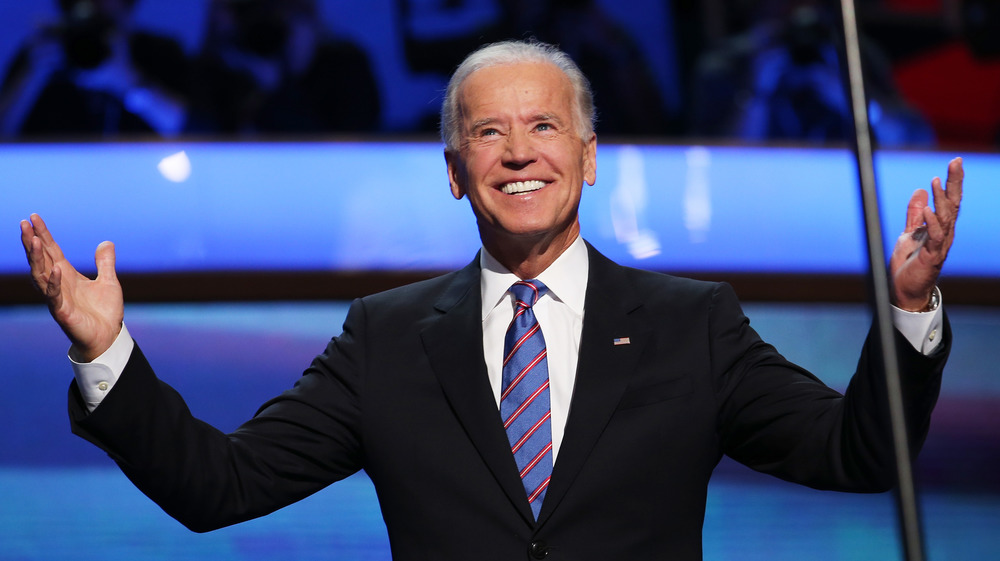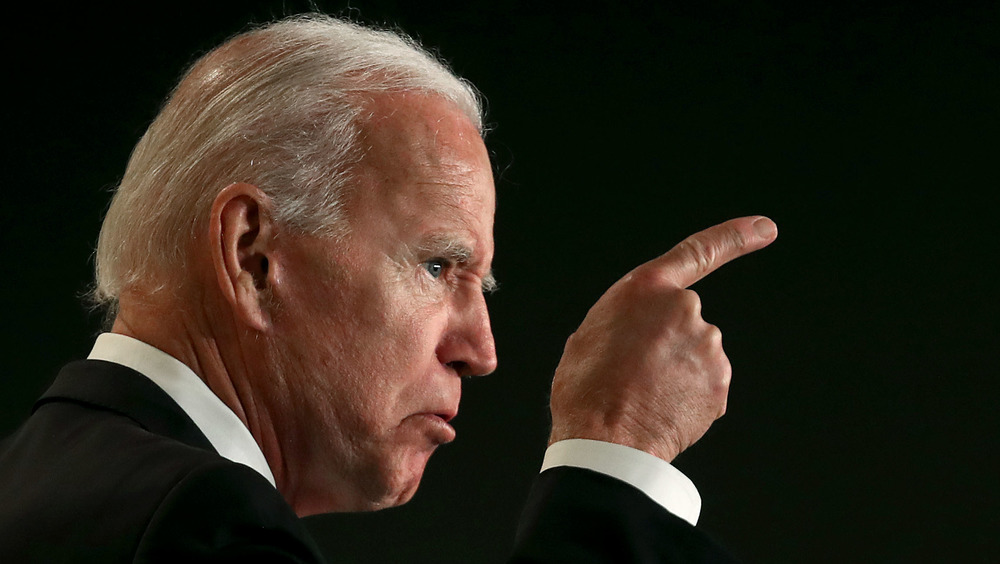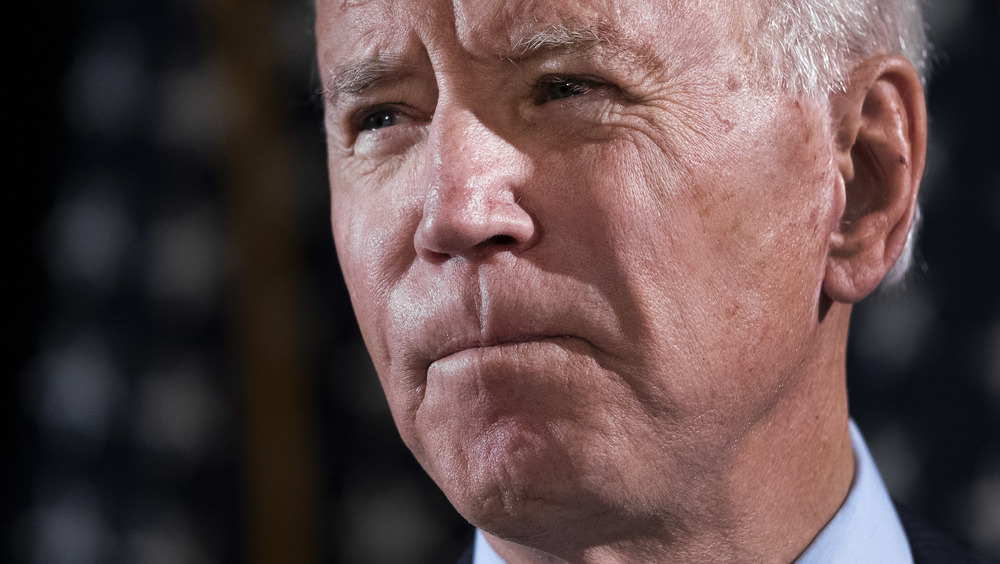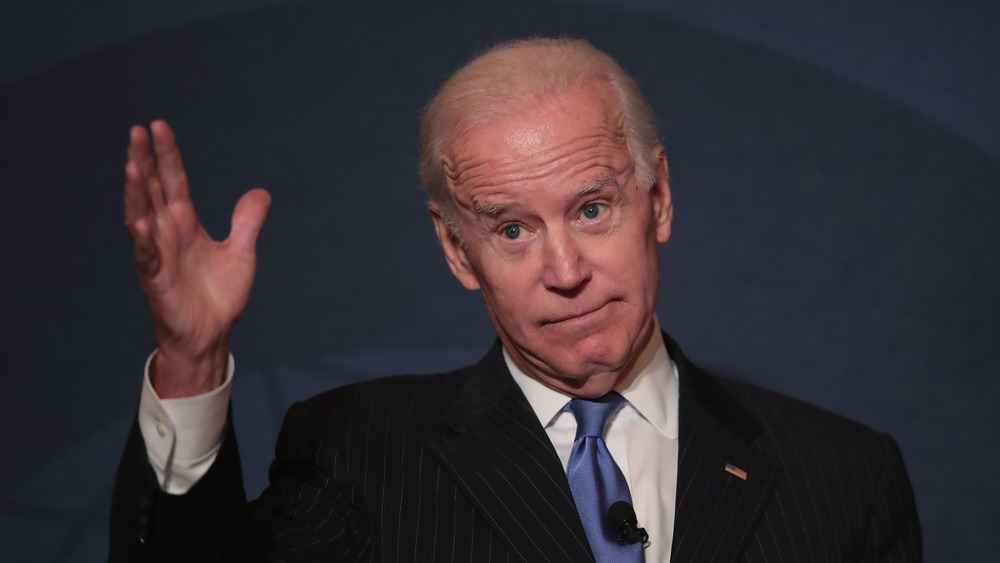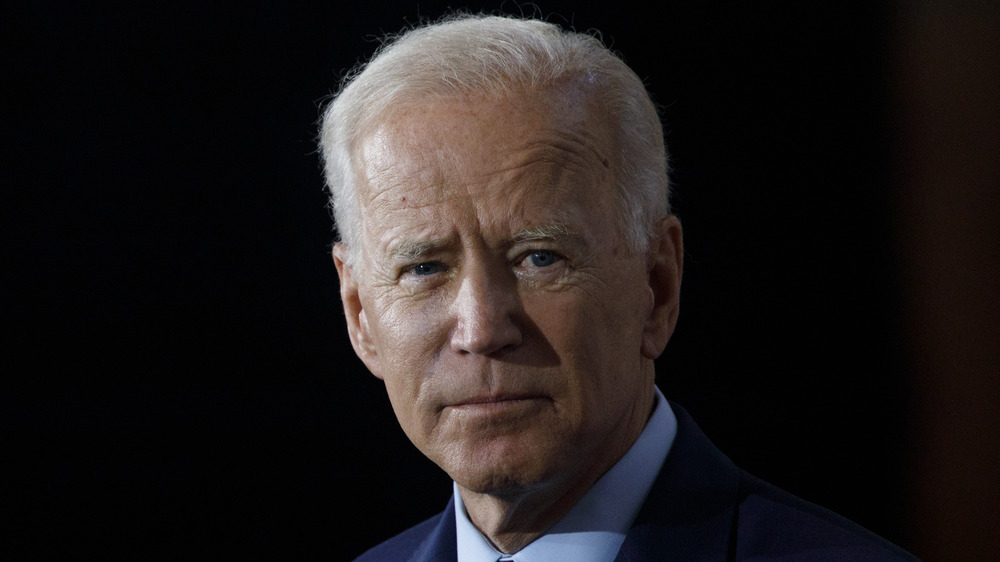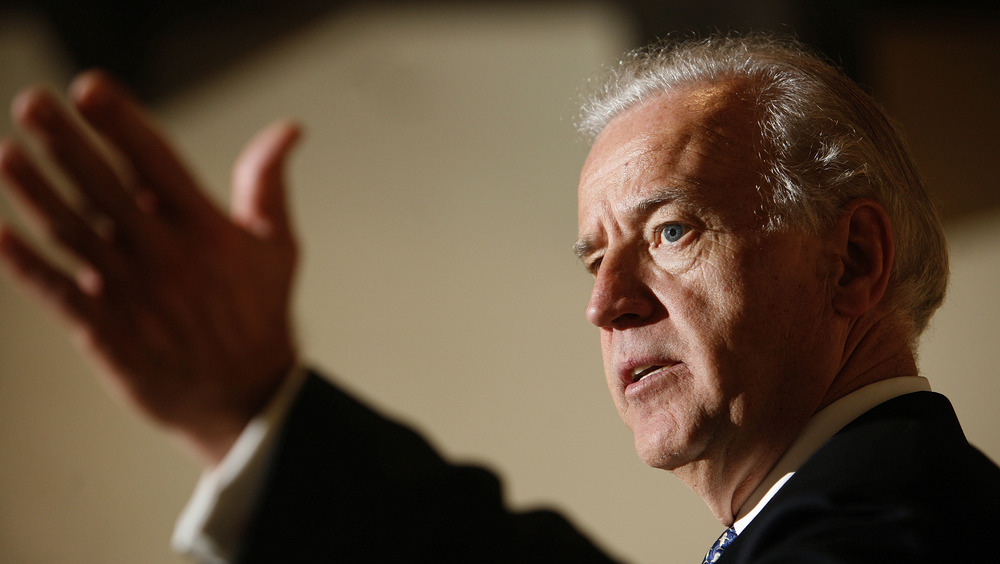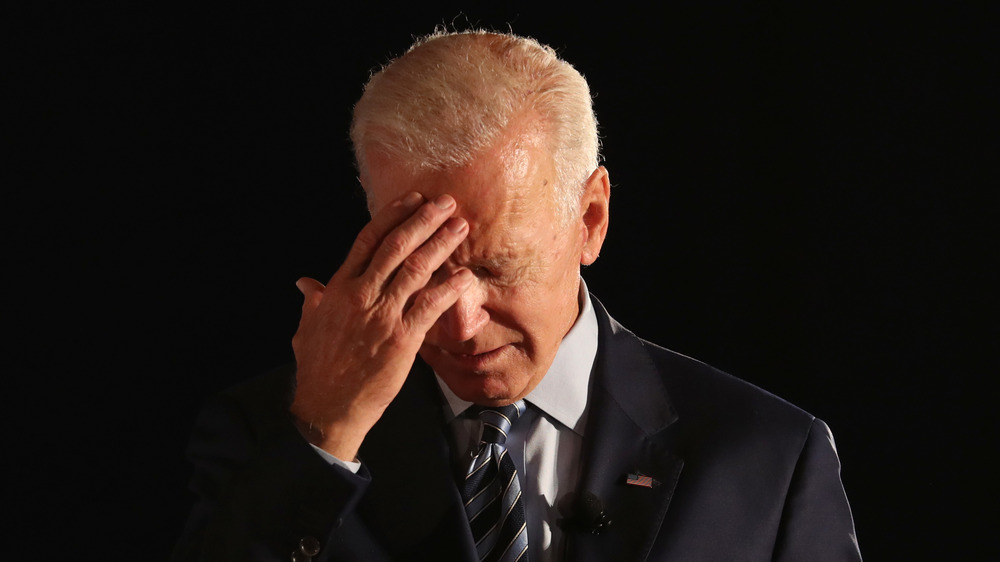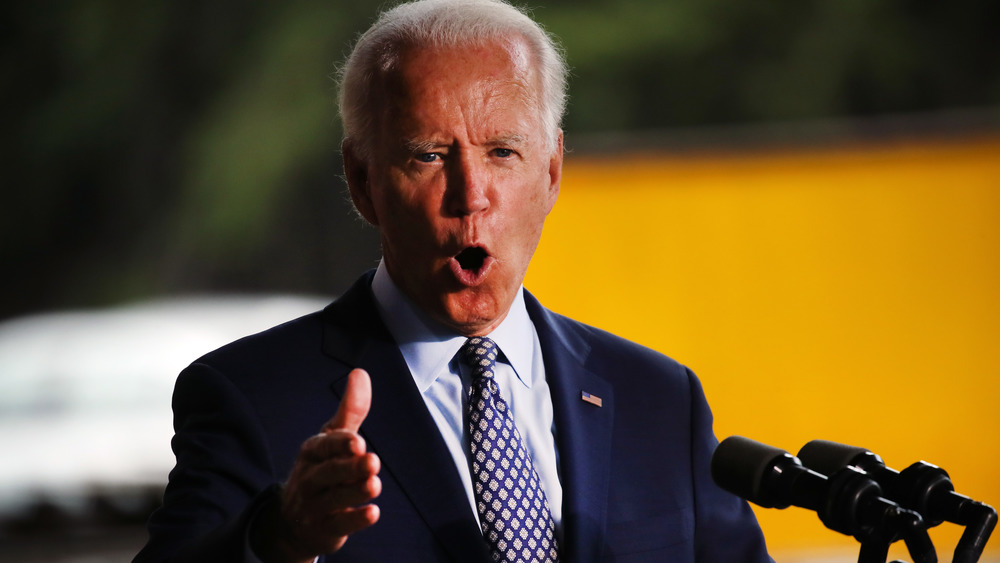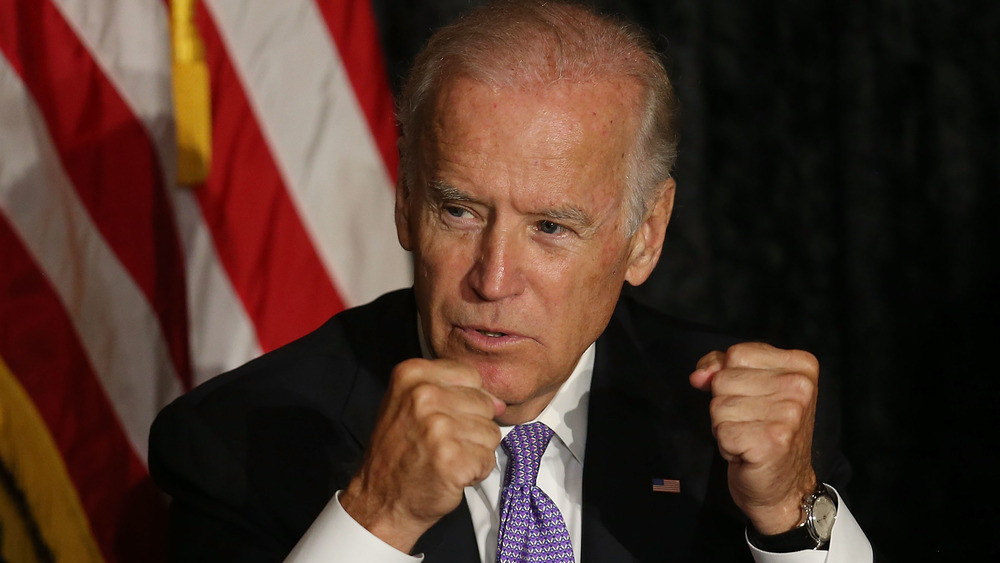The Shady Side Of Joe Biden
Ol' Scranton Joe finally got to be president. When Joe Biden was first elected to the Senate in 1972 — many hair incarnations ago — he was too young to even serve in that deliberative body. Biden celebrated his constitutionally required 30th birthday just before he was sworn in, according to Slate. But after nearly five decades in office, he's gone from political pup to the oldest man elected U.S. head of state. At his inauguration in 2021, Biden was older than every ex-president who attended the ceremony — older than Barack Obama, older than George W. Bush — even older than Bill Clinton, now all white-haired and sleepy, who left the oval office over two decades hence.
Biden first took a run at the oval in 1987. His campaign imploded in a spectacular series of puzzling blunders. The self-described "gaffe machine" made another blighted bid for POTUS powers in 2008, but had the deep misfortune of running into a buzzsaw named Obama. But he wasn't bitter. The better man won and Biden gracefully accepted two terms as VEEP, cementing his patriotic public profile — everybody loves a solid wingman.
All that patience finally paid off. Sworn in again in 2021, this time at age 78, with nearly 50 years of D.C. wrangling behind him, maybe it's no surprise there's also a hefty list of allegations and supposedly shady situations in the wake of this 46th man elected executive in chief. Let's dive in.
A plagiarism problem plateaued Joe Biden's first presidential bid
The first time Joe Biden wanted to be president, Ronald Reagan was in office, "Alone" by Heart was the top song of the year and 800,000 people took to the streets in San Francisco not to smash storefronts and rage against the machine, but merely to celebrate the existence of a cool bridge. 1987 just hit different. But it also gave then-candidate Biden a big kick in the butt when a plagiarism scandal ended his first bid for the presidency.
Biden was accused of lifting a riff about being the first in his family to go to college from a very "lyrical" and eloquent British Labour Party leader named Neil Kinnock, according to The New York Times. Biden had basically done the political version of a comedian taking someone else's bit — it wasn't a verbatim ripoff, but he wasn't doing his own material either, and it cut to his "authenticity" according to The Washington Post.
Other instances of Biden cribbing material without attribution soon surfaced and Biden admitted he'd also been accused of plagiarism in law school, again according to The Washington Post. "I made some mistakes," the then-senator said in a speech as he announced the end of his candidacy. A "defiant" Biden then oddly slipped into third-person. "But now, the exaggerated shadow of those mistakes has begun to obscure the essence of my candidacy and the essence of Joe Biden." In other words: I'll be back.
Joe Biden's civil rights activism exaggerations
The golden era of brazen, unchecked, bald-faced lying is, in some ways, behind us. Kids today just don't know how easy it used to be to make up wild anecdotes and accolades before we all had our lives so thoroughly documented online.
But even in the snail-mail era, saying you were involved in the civil rights marches of the 1960s when you totally weren't, was a bridge too far. This was another whopper from Joe Biden's disastrous 1987 presidential campaign. Biden bragged numerous times, on camera, about this heroic record, "When I marched in the civil rights movement ... I marched with tens of thousands of others to change attitudes. And we changed attitudes," he boasted on C-SPAN, via The Intercept. In another instance Biden claimed, again on camera, "I came out of the civil rights movement. I was one of those guys that sat in, and marched, and all that stuff."
The only problem is he never marched at all. Biden's handlers were reportedly so alarmed at his false claims, they repeatedly warned him to curb these fabrications on such a sensitive issue. Biden supposedly recognized the problem, but according to The New York Times, he "kept telling the story anyway." Biden did participate in at least two civil rights actions, including an effort to desegregate a movie theatre, but wildly "overstated" his civil rights credentials, per The Washington Post, which gave his claims two out of four possible Pinocchios.
This academic confrontation didn't go well for Joe Biden
The most cringe-inducing of Joe Biden's bungles that doomed his 1987 campaign had to be a dust-up the Scranton scrapper got into with a random voter about whom, exactly, was smarter. Biden's strong contention: it was himself! But, ironically, the candidate fabricated a bunch of scholastic honors to make his case.
"I think I probably have a much higher IQ than you do, I suspect!" bragged Biden, in an energetic rant, again captured by C-SPAN. He was responding to a voter who dared ask where Biden had graduated in his class. "I went to law school on a full academic scholarship ... I ... in fact, ended up in the top half of my class ... I was the outstanding student in the political science department at the end of my year. I graduated with three degrees ... and I'd be delighted to sit down and compare my IQ to yours, Frank."
Turns out poor Frank wasn't the fool. None of the above claims were true, revealed Newsweek, via The Washington Post. Biden had received only "a half scholarship," and that much was "based on financial need," not academics. He wasn't in the top half of his class, he was very near the bottom. And he hadn't earned three degrees, just one, a "B.A. in political science and history." This only compounded Biden's own admission he'd committed self-described non "malevolent" plagiarism in law school, documented via The New York Times.
Does Joe Biden have a hair trigger temper?
You'd think after the disastrous events of 1987, Joe Biden, still wanting to be president, would resolve to never again get sucked into an on-camera altercation with combative voters. The long-time senator from Scranton may be known for his back-slapping affability, but even in his late 70s, he still seems to take a tough question as a personal affront.
In March of 2020, a Biden campaign stop at a Fiat Chrysler assembly plant in Detroit went into a ditch when an autoworker accused him of wanting to take away his second amendment rights. Biden put pedal to metal, "You're full of sh*t," he roared, via NBC News. The worker reminded Biden who was auditioning to work for whom, and the candidate didn't take so kindly to that either, "I'm not working for you, gimme a break, man. Don't be such a horse's a**."
Months earlier Biden got into a similar clash when a voter accused him of corruption related to the foreign dealings of his son, Hunter Biden, later revealed to be the subject of an FBI investigation. "You're a damn liar man, that's not true," Joe responded. An aide tried to take the microphone from the hostile questioner, but Biden pressed in closer and challenged the heavy-set man to a push-up contest, in a video captured by The New York Times. The word "fat" seems to slip from Biden's mouth as he paces and finally deems the man "too old to vote for me."
Joe Biden was accused of groping numerous women
During Joe Biden's 2020 presidential campaign a slew of women came forward with various accusations that Biden violated their personal space with inappropriate levels of physical affection. Former Nevada Lieutenant Governor Lucy Flores wrote in an essay for The Cut that she was "shocked" and "embarrassed" when Biden allegedly smelled her hair and "plant[ed] a big slow kiss on the back of [her] head" at her own campaign event in 2014. Biden said in a statement he had no memory of this, but would "listen respectfully" to the accusations.
Congressional aide Amy Lappos, via the Hartford Courant, described a similar incident in 2009 where she thought an overly familiar Biden "was going to kiss [her] on the mouth." She never filed a formal complaint because, in her words she "was a nobody." Two other women, D.J. Hill and Caitlyn Caruso also told The New York Times about incidents where Biden's "tactile style" of politics crossed the line, but neither alleged harassment nor assault.
A former White House intern named Vail Kohnert-Yount also came forward in 2020 and alleged that in 2013, Biden introduced himself and "put his hand on the back of [her] head and pressed his forehead to [her] forehead." She says he then called her "pretty girl." Kohnert-Yount was "shocked" and described the incident to The Washington Post as "the kind of inappropriate behavior that makes many women feel uncomfortable and unequal in the workplace," but added she did not consider it sexual misconduct.
This apology video didn't exactly absolve Joe Biden
Another incident of Joe Biden getting too touchy-feely with a young woman happened, ironically, at the 2016 Oscars, where had introduced Lady Gaga performing in front of 51 sexual assault survivors, according to The Washington Post. After the performance, Biden clasped hands and put himself forehead to forehead with 22-year old survivor Sofie Karasek in a photo that went viral — the shot initially called "powerful" and "moving."
Karasek didn't think so. She told The Washington Post the gesture made her feel "awkward" and "uncomfortable." And though she initially framed the picture, she eventually took it down. Biden dropped a response video immediately, saying, "it's the way [he's] always been" and that his style has been a comfort to many in his career but that he understands the shifting "norms" about personal boundaries. "I hear what they're saying. I understand it," Biden continued, adding, "But I'll always believe governing, quite frankly ... is about connecting"
Again, Karasek disagreed, noting to WaPo that Biden's apology video, which contained no apology, "still didn't take ownership in the way that he needs to." She continued, "All of our interactions and friendships are a two-way street ... Too often it doesn't matter how the woman feels about it or they just assume that they're fine with it." One more young Democratic staffer, Ally Coll, also told the outlet, for this same story, Biden made her feel similarly physically "uncomfortable" in 2008.
Joe Biden was accused of sexual assault
Tara Reade's allegations against Joe Biden are serious, but contested. In fact, Vox politics editor, Laura McGann, who worked directly with Reade in an unsuccessful attempt to verify key elements of her story, wrote in May 2020 that she was left "mired in the miasma of uncertainty" over the allegations.
Speaking with The Union, Reade claimed her role as a young staffer in Biden's senate office in 1993 was reduced and eventually eliminated after she shrank from Biden's sexual advances. In addition to supposedly being made uncomfortable by unwanted touching from Biden, Reade also told Current Affairs that while she didn't make a formal complaint, she conferred with a supervisor, who allegedly told her to "keep [her] head down." Reade also claimed that shortly after that, she was called to a private meeting, during which Biden allegedly pressed her against a wall, kissed her, sexually assaulted her. Reade claimed she rebuffed Biden, who then allegedly said, "Come on man, I heard you liked me."
Biden's spokesperson told The New York Times that this allegation "is untrue. This absolutely did not happen." The Times spoke to other staffers who didn't recall the incident and further wrote they "found no pattern of sexual misconduct by Mr. Biden." But Reade says she only reported the harassment, never the assault, at least until Biden ran for president in 2019. Of the seven other women who have complained about Biden, "several" told The Times they believe Reade.
The mishandling of Anita Hill's accusations still haunts Joe Biden
Joe Biden was the senate judiciary chairman overseeing the Supreme Court nomination of Clarence Thomas in 1991 when Anita Hill, Thomas' former staffer, accused the nominee of sexual harassment. Her testimony, rebutted by Thomas' own accusations of a "high-tech lynching," became the he-said-she-said spectacle of the century. It was a huge stage for Biden, but he has long been "criticized for failing to call additional witnesses who could have supported Hill's claims, and sitting back when his Republican colleagues attacked her," according to Vox.
Biden expressed "regret," via The New York Times, and voted against confirming Thomas. But when he reached out to Hill in April 2019 ahead of his presidential candidacy announcement, the mea culpa didn't go as planned. Hill was reportedly "deeply unsatisfied" by their talk and was "not convinced that he has taken full responsibility for his conduct at the hearings — or for the harm he caused other victims of sexual harassment and gender violence." Hill also told The Times that "she was troubled" by the numerous Biden accusers and that Biden had "set the stage" for the confirmation of Justice Brett Kavanaugh, who faced far worse accusations than Thomas. However, she did not think this disqualified Biden from being president. "I'm really open to people changing," she added.
Hill later endorsed Biden's candidacy, telling CNN's Gloria Berger (via Newsweek) that she felt Biden's views had "evolved" since that Spring 2019 chat, and that he would be receptive to working with her on "gender issues."
Is Joe Biden's sketchy association with segregationists justified?
Before Kamala Harris was Joe Biden's pick for vice president, she wanted the top of the ticket for herself and went after Biden's history of collegiality in an era when the senate chamber still housed open opponents of civil rights. Harris decried Biden's praise of senators "who built their reputations and career on the segregation of race in this country," though she prefaced that remark saying she didn't think Biden was a racist, personally.
This is because, back in 1975, then-freshman Senator Biden had sponsored a bill at the behest of his "white constituents in Delaware," claimed NBC News, that "would limit the power of courts to order school desegregation with busing." Famed civil rights lawyer of that era, Jack Greenberg, said at the time the bill "heaves a brick through the window of school integration." The Nation outright charged that Biden "collaborated with segregationists" as he had proposed a constitutional amendment to eliminate busing because he deemed it ineffective.
Not everyone agrees with these dire assessments. Huntington College history professor and Washington Post columnist Marcus Witcher called these criticisms "unfair" in that they don't acknowledge the realpolitik of the time. Segregationists held considerable power. Other Democrats, including former President Jimmy Carter, had to appease them to achieve productive bipartisan compromises, too. "[Biden's] history is not one of supporting the segregationist cause, or anything close to it," Witcher concluded, adding, "He rightly touts legislative successes in the area of civil rights as major achievements in his career."
Joe Biden's racial gaffes piled up
What makes a political gaffe truly a gaffe, and not just some trite flub, is when it reveals something meaningful about how a candidate actually thinks.
In 2020, Joe Biden badly needed to replicate the Barack Obama coalition of 2008 and 2012, which meant securing an overwhelming share of Black voter support. Democrats can usually count on that in presidential elections, but you still gotta ask nicely. During a video interview with Charlemagne Tha God on The Breakfast Club, Biden declared, in a suddenly odd jive-talking accent, "If you have a problem figuring out whether you're for me or Trump, then you ain't' Black." Biden followed that fascinating proclamation with a half-baked defense of his civil rights "record," culminating in a decidedly inarticulate "I mean, c'mon!"
We all know politicians think in terms of group demographics as they wrangle constituencies, but they try not to so plainly spell out such electoral gamesmanship. But then a similarly back-handed black-community gaffe ensued as Biden pandered to Latino voters, another crucial constituency, during an interview with NPR's Lulu Garcia-Navarro, saying, "What you all know, but most people don't know, unlike the African American community, with notable exceptions, the Latino community is an incredibly diverse community." Biden's campaign started putting a lid on morning media stops shortly thereafter.
Joe Biden's Donald Trump beat-down fantasy
2020 was a year marred by political violence across the ideological spectrum. And it probably doesn't help inspire calm when leaders are openly fantasizing about feeding knuckle sandwiches to their enemies, too.
During the run-up to Joe Biden's successful Democratic primary campaign, he had some fighting words for then-President Donald Trump while speaking at the University of Miami. "They asked me would I like to debate this gentleman, and I said, 'No.' I said, 'If we were in high school, I'd take him behind the gym and beat the hell out of him.'" Biden said nearly the same thing at a campaign event for Hillary Clinton in 2016.
Clearly, then-candidate Biden was playing to the crowd, and his tough-talking remarks were greeted with much enthusiasm. But Biden got pushback on his puffery. "America's leaders shouldn't glorify violence. It's a point liberals have made many times since Trump's political rise," wrote a normally friendly left-leaning The Atlantic. Biden's remarks were aimed at Trump's own brags about committing sexual assault with impunity as captured on the infamous Access Hollywood tape, but the equally left-leaning Washington Post columnist Alyssa Rosenberg also said thanks, but no thanks, to big-brother Biden stepping in to save the day with his fists, "Both men were trying to prove their virility at someone else's expense," Rosenberg wrote, adding, "In Trump's case, that someone else was the women who, theoretically, will let a famous man do anything. In Biden's, it was another man he boasted he could dominate."
